《运动解剖学》课程文献资料(脑科学)基于项目化学习培养科学思维能力的实践研究以高中生物学探究实验为例
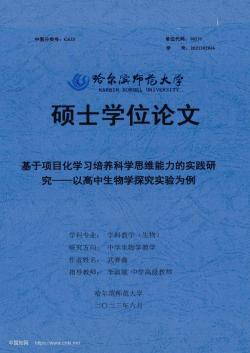
中图分类号:G633 单位代码:10231 学号,2021302046 ⑨拾尔宾师危大学 HARBIN NORMAL UNIVERSITY 硕士学位论文 基于项目化学习培养科学思维能力的实践研 究一以高中生物学探究实验为例 学科专业:学科教学(生物 研究方向:中学生物学教学 作者姓名:武赛鑫 指导教师:李淑敏中学高级教师 哈尔滨师范大学 二O士三年六月 中国知网htps:/www.cnki.nel
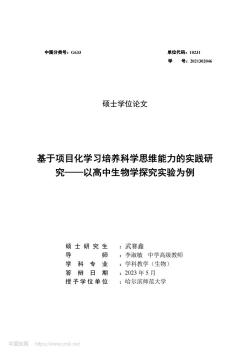
中图分类号:G633 单位代码:10231 学号:2021302046 硕士学位论文 基于项目化学习培养科学思维能力的实践研 究—以高中生物学探究实验为例 硕士研究生:武赛鑫 导 师 :李淑敏中学高级教师 学科专业 :学科教学(生物) 答辩日期 :2023年5月 授予学位单位 :哈尔滨师范大学 中国知网https://www.cnki.nel
中图分类号:G633 单位代码:10231 学 号:2021302046 硕士学位论文 基于项目化学习培养科学思维能力的实践研 究——以高中生物学探究实验为例 硕 士 研 究 生 :武赛鑫 导 师 :李淑敏 中学高级教师 学 科 专 业 :学科教学(生物) 答 辩 日 期 :2023 年 5 月 授 予 学 位 单 位 :哈尔滨师范大学
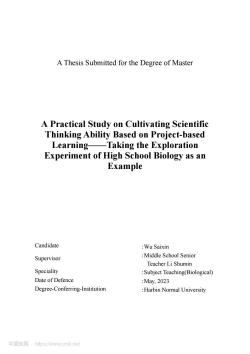
A Thesis Submitted for the Degree of Master A Practical Study on Cultivating Scientific Thinking Ability Based on Project-based Learning-Taking the Exploration Experiment of High School Biology as an Example Candidate Wu Saixin Supervisor Middle School Senior Teacher Li Shumin Speciality Subject Teaching(Biological) Date of Defence :May,2023 Degree-Conferring-Institution Harbin Normal University 中国知网https://www.cnki.ne
A Thesis Submitted for the Degree of Master A Practical Study on Cultivating Scientific Thinking Ability Based on Project-based Learning——Taking the Exploration Experiment of High School Biology as an Example Candidate :Wu Saixin Supervisor :Middle School Senior Teacher Li Shumin Speciality :Subject Teaching(Biological) Date of Defence :May, 2023 Degree-Conferring-Institution :Harbin Normal University
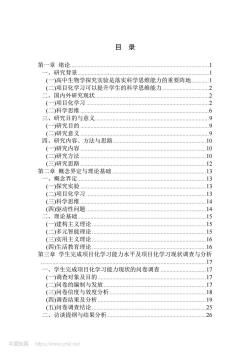
目录 第一章绪论 一、研究背景 (一)高中生物学探究实验是落实科学思维能力的重要阵地 (二)项目化学习可以提升学生的科学思维能力 二、国内外研究现状 (一)项目化学习 二)科学思维 6 三、研究目的与意义 0 (一)研究目的 9 (二)研究意义 四、研究内容、方法与思路 10 (一)研究内容 1 (二)研究方法 .10 (三)研究思路 12 第二章概念界定与理论基础 13 概念界定 13 (一)探究实验 13 (二)项目化学习 (三)科学思维 14 (四)驱动性问题 14 一、理论基出 15 (一)建构主义理论 .15 (二)多元智能理论 15 (三)实用主义理论 6 (四)生活教育理论 16 第三章学生完成项目化学习能力水平及项目化学习现状调查与分析 17 学生完成项目化学习能力现状的问卷调查. 17 (一)调查对象及目的 17 (二)问卷的编制与发放 17 (三)问卷信度与效度分析 18 (四)调查结果及分析 (五)问卷调查结论 25 二、访谈提纲与结果分析 . 26 中国知网htps/www.cnki.ne
目 录 第一章 绪论.1 一、研究背景.1 (一)高中生物学探究实验是落实科学思维能力的重要阵地.1 (二)项目化学习可以提升学生的科学思维能力.2 二、国内外研究现状.2 (一)项目化学习.2 (二)科学思维.6 三、研究目的与意义.9 (一)研究目的.9 (二)研究意义.9 四、研究内容、方法与思路.10 (一)研究内容.10 (二)研究方法.10 (三)研究思路.12 第二章 概念界定与理论基础 .13 一、概念界定.13 (一)探究实验.13 (二)项目化学习.13 (三)科学思维.14 (四)驱动性问题.14 二、理论基础.15 (一)建构主义理论.15 (二)多元智能理论.15 (三)实用主义理论.16 (四)生活教育理论.16 第三章 学生完成项目化学习能力水平及项目化学习现状调查与分析 .17 一、学生完成项目化学习能力现状的问卷调查 .17 (一)调查对象及目的.17 (二)问卷的编制与发放.17 (三)问卷信度与效度分析.18 (四)调查结果及分析.19 (五)问卷调查结论.25 二、访谈提纲与结果分析.26
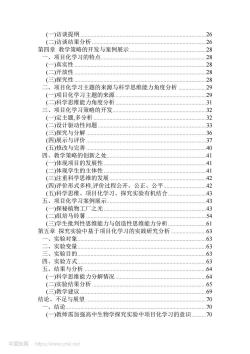
(一)访谈提纲 .26 (二)访谈结果分析 26 第四章教学策略的开发与案例展示 28 一、项目化学习的特点 .28 (一)真实性 28 (二)开放性 .28 (三)探究性 28 二、项目化学习主题的来源与科学思维能力角度分析 29 (一)项目化学习主题的来源 29 (二)科学思维能力角度分析 .31 三、项目化学习策略的开发 .32 (一)定主题多分析 32 (二)设计驱动性问题 33 一)探究与分解 36 (四)展示与评价.。 3> (五)修改与完善 40 四、教学策略的创新之处 .41 (一)体现项目的发展性 41 (二)体现学生的主体性 .41 三)注重科学思维的发展 42 (四)评价形式多样,评价过程公开、公正、公平」 2 (五)科学思维、项目化学习、探究实验有机结合 .43 五、项目化学习案例展示 .43 (一)探秘植物工厂之光 43 (二)组培马铃薯 .54 (三)学生批判性思维能力与创造性思维能力分析 .61 第五章探究实验中基于项目化学习的实践研究分析 . 实验对象 63 实验变量, .63 实验目的 四、实验方式 .63 五、结果与分析 (一)科学思维能力分解情况 64 (二)实验结果分析 6 (三)教学建议 69 结论、不足与展望 .70 一、结论 70 (一)教师需加强高中生物学探究实验中项目化学习的意识70 中国知网https://www.cnki.ne
(一)访谈提纲.26 (二)访谈结果分析.26 第四章 教学策略的开发与案例展示 .28 一、项目化学习的特点.28 (一)真实性.28 (二)开放性.28 (三)探究性.28 二、项目化学习主题的来源与科学思维能力角度分析 .29 (一)项目化学习主题的来源.29 (二)科学思维能力角度分析.31 三、项目化学习策略的开发.32 (一)定主题,多分析.32 (二)设计驱动性问题.33 (三)探究与分解.36 (四)展示与评价.37 (五)修改与完善.40 四、教学策略的创新之处.41 (一)体现项目的发展性.41 (二)体现学生的主体性.41 (三)注重科学思维的发展.42 (四)评价形式多样,评价过程公开、公正、公平.42 (五)科学思维、项目化学习、探究实验有机结合.43 五、项目化学习案例展示.43 (一)探秘植物工厂之光.43 (二)组培马铃薯.54 (三)学生批判性思维能力与创造性思维能力分析.61 第五章 探究实验中基于项目化学习的实践研究分析 .63 一、实验对象.63 二、实验变量.63 三、实验目的.63 四、实验方式.63 五、结果与分析.64 (一)科学思维能力分解情况.64 (二)实验结果分析.65 (三)教学建议.69 结论、不足与展望 .70 一、结论.70 (一)教师需加强高中生物学探究实验中项目化学习的意识.70
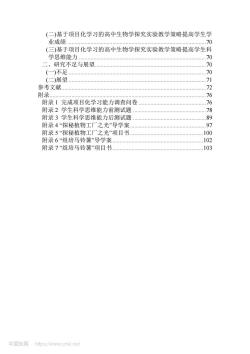
(二)基于项目化学习的高中生物学探究实验教学策略提高学生学 业成绩. .70 (三)基于项目化学习的高中生物学探究实验教学策略提高学生科 学思维能力 .70 二、研究不足与展望 .70 (一)不足 70 (二)展望 .71 参考文献. 72 附录 .76 附录1完成项目化学习能力调查问卷 76 附录2学生科学思维能力前测试题 .78 附录3学生科学思维能力后测试题 .89 附录4“探秘植物工厂之光”导学案 97 附录5“探秘植物工厂之光”项目书 .100 附录6“组培马铃薯”导学案。 .102 附录7“组培马铃薯”项目书 .103 中国知网https://www.cnki.ne
(二)基于项目化学习的高中生物学探究实验教学策略提高学生学 业成绩 .70 (三)基于项目化学习的高中生物学探究实验教学策略提高学生科 学思维能力 .70 二、研究不足与展望.70 (一)不足.70 (二)展望.71 参考文献.72 附录.76 附录 1 完成项目化学习能力调查问卷 .76 附录 2 学生科学思维能力前测试题 .78 附录 3 学生科学思维能力后测试题 .89 附录 4 “探秘植物工厂之光”导学案.97 附录 5 “探秘植物工厂之光”项目书.100 附录 6 “组培马铃薯”导学案.102 附录 7 “组培马铃薯”项目书.103
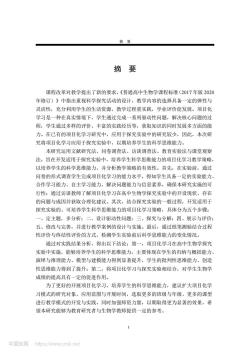
摘要 摘要 课程改革对教学提出了新的要求,《普通高中生物学课程标准(2017年版2020 年修订)》中指出重视科学探究活动的设计,教学内容的选择具备一定的弹性与 灵活性,充分利用学生的生活资源,教学过程重实践,学业评价促发展。项目化 学习是一种在真实情境下,学生通过完成一系列驱动性问题,解决核心问题的过 程,学生通过多样的评价、丰富的实践经历等,获取知识的同时发展多方面的能 力。在已有的项目化学习研究中,应用于探究实验中的研究较少,因此,本次研 究将项目化学习应用于探究实验中,以期培养学生的科学思维能力。 本研究运用文献研究法、问卷调查法、访谈调查法、教育实验法与课堂观察 法,旨在开发适用于探究实验中,培养学生科学思维能力的项目化学习教学策略 以培养学生的科学思维能力,并分析教学策略的有效性。首先,在实验前,通过 问卷的形式调查学生完成项目化学习的能力水平,得知学生具备一定的实验能力、 合作学习能力、自主学习能力、解决问题能力与信息素养,确保本研究实施的可 行性:通过访谈教师了解项目化学习在高中生物学探究实验中的开设现状、存在 的问题与成因并获取合理化建议。其次,结合探究实验的一般过程,开发适用于 探究实验的、可培养学生科学思维能力的项目化学习策略,具体分为五个步骤: 一、定主题,多分析:二、设计驱动性问题:三、探究与分解:四、展示与评价: 五、修改与完善,并进行教学案例的设计与实施。最后,通过纸笔测验结合过程 性评价与终结性评价的方式,检测学生实验前后科学思维能力的变化情况。 通过对实践结果分析,得出以下结论:第一,项目化学习在高中生物学探究 实验中实施,能够培养学生的科学思维能力,主要体现在学生的归纳与概括能力、 演绎与推理能力、模型与建模能力得到显著提升,学生的批判性思维能力、创造 性思维能力得到了提升:第二,将项目化学习与探究实验相结合,对学生生物学 成绩的提高具有一定的促进作用。 为了更好的开展项目化学习,培养学生的科学思维能力,建议扩大项目化学 习模式的研究对象、应用范围与开展时间,选取更多的班级与年级、更多的课型 进行教学模式的开发与实践,同时加强师资力量,以期取得更为显著的效果,希 望本研究能够为教育研究者与生物学教师提供一定的参考。 1 中国知网https://www.cnki.ne
摘 要 I 摘 要 课程改革对教学提出了新的要求,《普通高中生物学课程标准(2017 年版 2020 年修订)》中指出重视科学探究活动的设计,教学内容的选择具备一定的弹性与 灵活性,充分利用学生的生活资源,教学过程重实践,学业评价促发展。项目化 学习是一种在真实情境下,学生通过完成一系列驱动性问题,解决核心问题的过 程,学生通过多样的评价、丰富的实践经历等,获取知识的同时发展多方面的能 力。在已有的项目化学习研究中,应用于探究实验中的研究较少,因此,本次研 究将项目化学习应用于探究实验中,以期培养学生的科学思维能力。 本研究运用文献研究法、问卷调查法、访谈调查法、教育实验法与课堂观察 法,旨在开发适用于探究实验中,培养学生科学思维能力的项目化学习教学策略, 以培养学生的科学思维能力,并分析教学策略的有效性。首先,在实验前,通过 问卷的形式调查学生完成项目化学习的能力水平,得知学生具备一定的实验能力、 合作学习能力、自主学习能力、解决问题能力与信息素养,确保本研究实施的可 行性;通过访谈教师了解项目化学习在高中生物学探究实验中的开设现状、存在 的问题与成因并获取合理化建议。其次,结合探究实验的一般过程,开发适用于 探究实验的、可培养学生科学思维能力的项目化学习策略,具体分为五个步骤: 一、定主题,多分析;二、设计驱动性问题;三、探究与分解;四、展示与评价; 五、修改与完善,并进行教学案例的设计与实施。最后,通过纸笔测验结合过程 性评价与终结性评价的方式,检测学生实验前后科学思维能力的变化情况。 通过对实践结果分析,得出以下结论:第一,项目化学习在高中生物学探究 实验中实施,能够培养学生的科学思维能力,主要体现在学生的归纳与概括能力、 演绎与推理能力、模型与建模能力得到显著提升,学生的批判性思维能力、创造 性思维能力得到了提升;第二,将项目化学习与探究实验相结合,对学生生物学 成绩的提高具有一定的促进作用。 为了更好的开展项目化学习,培养学生的科学思维能力,建议扩大项目化学 习模式的研究对象、应用范围与开展时间,选取更多的班级与年级、更多的课型 进行教学模式的开发与实践,同时加强师资力量,以期取得更为显著的效果,希 望本研究能够为教育研究者与生物学教师提供一定的参考

哈尔滨师范大学硕士学位论文 关键词项目化学习;科学思维能力:探究实验 中国知网https://www.cnki.net
哈尔滨师范大学硕士学位论文 II 关键词 项目化学习;科学思维能力;探究实验
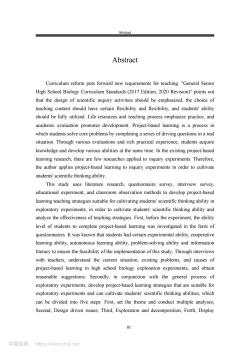
Abstract Abstract Curriculum reform puts forward new requirements for teaching."General Senior High School Biology Curriculum Standards(2017 Edition,2020 Revision)"points out that the design of scientific inquiry activities should be emphasized,the choice of teaching content should have certain flexibility and flexibility,and students'ability should be fully utilized.Life resources and teaching process emphasize practice,and academic evaluation promotes development.Project-based learning is a process in which students solve core problems by completing a series of driving questions in a real situation.Through various evaluations and rich practical experience,students acquire knowledge and develop various abilities at the same time.In the existing project-based learning research,there are few researches applied to inquiry experiments.Therefore, the author applies project-based learning to inquiry experiments in order to cultivate students'scientific thinking ability This study uses literature research,questionnaire survey,interview survey. educational experiment,and classroom observation methods to develop project-based learning teaching strategies suitable for cultivating students'scientific thinking ability in exploratory experiments,in order to cultivate students'scientific thinking ability and analyze the effectiveness of teaching strategies.First.before the experiment,the ability level of students to complete project-based leamning was investigated in the form of questionnaires.It was known that students had certain experimental ability,cooperative learning ability,autonomous learning ability,problem-solving ability and information literacy to ensure the feasibility of the implementation of this study:Through interviews with teachers,understand the current situation,existing problems,and causes of project-based learning in high school biology exploration experiments,and obtain reasonable suggestions.Secondly.in conjunction with the general process of exploratory experiments,develop project-based learning strategies that are suitable for exploratory experiments and can cultivate students'scientific thinking abilities,which can be divided into five steps:First,set the theme and conduct multiple analyses; Second,Design driven issues,Third,Exploration and decomposition,Forth,Display 中国知网https://www.cnki.ne
Abstract III Abstract Curriculum reform puts forward new requirements for teaching. "General Senior High School Biology Curriculum Standards (2017 Edition, 2020 Revision)" points out that the design of scientific inquiry activities should be emphasized, the choice of teaching content should have certain flexibility and flexibility, and students' ability should be fully utilized. Life resources and teaching process emphasize practice, and academic evaluation promotes development. Project-based learning is a process in which students solve core problems by completing a series of driving questions in a real situation. Through various evaluations and rich practical experience, students acquire knowledge and develop various abilities at the same time. In the existing project-based learning research, there are few researches applied to inquiry experiments. Therefore, the author applies project-based learning to inquiry experiments in order to cultivate students' scientific thinking ability. This study uses literature research, questionnaire survey, interview survey, educational experiment, and classroom observation methods to develop project-based learning teaching strategies suitable for cultivating students' scientific thinking ability in exploratory experiments, in order to cultivate students' scientific thinking ability and analyze the effectiveness of teaching strategies. First, before the experiment, the ability level of students to complete project-based learning was investigated in the form of questionnaires. It was known that students had certain experimental ability, cooperative learning ability, autonomous learning ability, problem-solving ability and information literacy to ensure the feasibility of the implementation of this study; Through interviews with teachers, understand the current situation, existing problems, and causes of project-based learning in high school biology exploration experiments, and obtain reasonable suggestions. Secondly, in conjunction with the general process of exploratory experiments, develop project-based learning strategies that are suitable for exploratory experiments and can cultivate students' scientific thinking abilities, which can be divided into five steps: First, set the theme and conduct multiple analyses; Second, Design driven issues; Third, Exploration and decomposition; Forth, Display
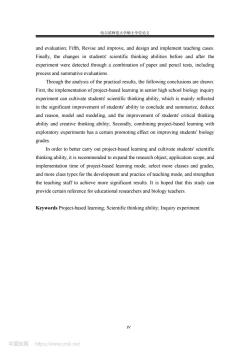
哈尔滨师范大学硕士学位论文 and evaluation;Fifth,Revise and improve,and design and implement teaching cases. Finally,the changes in students'scientific thinking abilities before and after the experiment were detected through a combination of paper and pencil tests,including process and summative evaluations. Through the analysis of the practical results,the following conclusions are drawn: First,the implementation of project-based learning in senior high school biology inquiry experiment can cultivate students'scientific thinking ability,which is mainly reflected in the significant improvement of students'ability to conclude and summarize,deduce and reason,model and modeling,and the improvement of students'critical thinking ability and creative thinking ability,Secondly,combining project-based learning with exploratory experiments has a certain promoting effect on improving students'biology grades. In order to better carry out project-based learning and cultivate students'scientific thinking ability.it is recommended to expand the research object.application scope.and implementation time of project-based learning mode,select more classes and grades. and more class types for the development and practice of teaching mode,and strengthen the teaching staff to achieve more significant results.It is hoped that this study can provide certain reference for educational researchers and biology teachers Keywords Project-based learning:Scientific thinking ability:Inquiry experiment 中国知网https://www.cnki.ne
哈尔滨师范大学硕士学位论文 IV and evaluation; Fifth, Revise and improve, and design and implement teaching cases. Finally, the changes in students' scientific thinking abilities before and after the experiment were detected through a combination of paper and pencil tests, including process and summative evaluations. Through the analysis of the practical results, the following conclusions are drawn: First, the implementation of project-based learning in senior high school biology inquiry experiment can cultivate students' scientific thinking ability, which is mainly reflected in the significant improvement of students' ability to conclude and summarize, deduce and reason, model and modeling, and the improvement of students' critical thinking ability and creative thinking ability; Secondly, combining project-based learning with exploratory experiments has a certain promoting effect on improving students' biology grades. In order to better carry out project-based learning and cultivate students' scientific thinking ability, it is recommended to expand the research object, application scope, and implementation time of project-based learning mode, select more classes and grades, and more class types for the development and practice of teaching mode, and strengthen the teaching staff to achieve more significant results. It is hoped that this study can provide certain reference for educational researchers and biology teachers. Keywords Project-based learning; Scientific thinking ability; Inquiry experiment
按次数下载不扣除下载券;
注册用户24小时内重复下载只扣除一次;
顺序:VIP每日次数-->可用次数-->下载券;
- 《运动解剖学》课程文献资料(脑科学)基于脑科学的微课教学设计探索.pdf
- 《运动解剖学》课程文献资料(脑科学)基于翻转课堂的小学科学项目式学习活动设计研究.pdf
- 《运动解剖学》课程文献资料(脑科学)基于突触可塑性的复杂系统中信息传输机制的研究.pdf
- 《运动解剖学》课程文献资料(脑科学)基于科学探究能力发展的项目式学习在中学生物学教学中的实践研究.pdf
- 《运动解剖学》课程文献资料(脑科学)基于科创竞赛的科学教育:学习环境、学习过程与培养效果.pdf
- 《运动解剖学》课程文献资料(脑科学)基于神经科学的道德认知研究_艾鹏.pdf
- 《运动解剖学》课程文献资料(脑科学)基于混合式教学的中医内科学学习策略探究_于鹏龙.pdf
- 《运动解剖学》课程文献资料(脑科学)基于混合学习的生物科学专业学生学习风格研究以唐山师范学院为例.pdf
- 《运动解剖学》课程文献资料(脑科学)基于学本评估”理论的混合学习评价活动设计研究.pdf
- 《运动解剖学》课程文献资料(脑科学)基于学习科学的“以学为中心”教学研究与实践_刘庆华.pdf
- 《运动解剖学》课程文献资料(脑科学)后疫情时代人类学习的未来趋向系统科学的哲学思考.pdf
- 《运动解剖学》课程文献资料(脑科学)创新思维的脑生理、心理协同发生机制探析.pdf
- 《运动解剖学》课程文献资料(脑科学)共同富裕视域下分配公平对幸福感的影响因果推断与机器学习在社会科学中的融合应用.pdf
- 《运动解剖学》课程文献资料(脑科学)从脑科学诠释体育运动提升学习效益的理论与实践_周成林.pdf
- 《运动解剖学》课程文献资料(脑科学)从STEM到STEAM脑科学基础及教育启示.pdf
- 《运动解剖学》课程文献资料(脑科学)《非常规教学法:脑科学实用观促进学习》(第三、四章)翻译实践报告.pdf
- 《运动解剖学》课程文献资料(脑科学)《非常规教学法:脑科学实用观促进学习》(第一、二章)翻译实践报告.pdf
- 《运动解剖学》课程教学资源(文献资料)心脏与骨骼肌Smyd1及其运动干预研究进展.pdf
- 山东理工大学:《运动解剖学》课程教学资源(授课教案,共二十八课次).pdf
- 《运动解剖学》课程文献资料(脑科学)运动促进大脑健康:来自行为和脑科学的证据_金鑫虹.pdf
- 《运动解剖学》课程文献资料(脑科学)基于项目式学习的科学教育领域跨学科概念建构.pdf
- 《运动解剖学》课程文献资料(脑科学)建筑的神经科学研究——缘起、内容与工具_周祥.pdf
- 《运动解剖学》课程文献资料(脑科学)教育文化视域下学习科学的研究趋势_李凤营.pdf
- 《运动解剖学》课程文献资料(脑科学)教育神经科学视域下的高中物理教学设计研究以静电场及其应用”为例.pdf
- 《运动解剖学》课程文献资料(脑科学)教育神经科学视角下小学汉字学习的教学设计与运用.pdf
- 《运动解剖学》课程文献资料(脑科学)核心素养视域下小学科学学习活动设计思路及模型搭建.pdf
- 《运动解剖学》课程文献资料(脑科学)混合学习环境下高校课堂论证式教学研究.pdf
- 《运动解剖学》课程文献资料(脑科学)焦虑的脑科学研究与临床应用进展.pdf
- 《运动解剖学》课程文献资料(脑科学)结合脑科学的生物学学科核心素养培养策略.pdf
- 《运动解剖学》课程文献资料(脑科学)脑科学与五育融合:劳动教育的审美功能.pdf
- 《运动解剖学》课程文献资料(脑科学)跨学科开启头脑风暴_促进脑科学交叉与融合_蒲慕明.pdf
- 《运动解剖学》课程教学资源(文献资料)基于肌肉激活度的关节运动角度分层预测.pdf
- 《运动解剖学》课程教学资源(文献资料)身体功能训练在肩关节运动功能恢复中的应用研究——以优秀男子举重运动员SLAP损伤个案为例.pdf
- 《运动解剖学》课程教学资源(文献资料)运动干预对髌股关节疼痛综合征的康复效果研究.pdf
- 《运动解剖学》课程教学资源(文献资料)经颅直流电刺激对肘关节等动运动中力量输出、肌肉活性的影响.pdf
- 长春中医药大学:《中医护理学基础》课程教学实训指导(针刺法、灸法、拔罐法).pdf
- 长春中医药大学:《中医护理学基础》课程教学课件(PPT讲稿)切诊.ppt
- 长春中医药大学:《中医护理学基础》课程教学课件(PPT讲稿)闻诊.ppt
- 长春中医药大学:《中医护理学基础》课程教学课件(PPT讲稿)问诊.ppt
- 长春中医药大学:《中医护理学基础》课程教学课件(PPT讲稿)望诊.ppt
